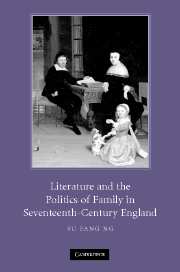Book contents
- Frontmatter
- Contents
- Acknowledgments
- Introduction: strange bedfellows – patriarchalism and revolutionary thought
- PART I REVOLUTIONARY DEBATES
- 1 Father-kings and Amazon queens
- 2 Milton's band of brothers
- 3 Hobbes and the absent family
- 4 Cromwellian fatherhood and its discontents
- PART II RESTORATION IMAGININGS
- Epilogue: the family-state analogy's eighteenth-century afterlife
- Index
1 - Father-kings and Amazon queens
Published online by Cambridge University Press: 22 September 2009
- Frontmatter
- Contents
- Acknowledgments
- Introduction: strange bedfellows – patriarchalism and revolutionary thought
- PART I REVOLUTIONARY DEBATES
- 1 Father-kings and Amazon queens
- 2 Milton's band of brothers
- 3 Hobbes and the absent family
- 4 Cromwellian fatherhood and its discontents
- PART II RESTORATION IMAGININGS
- Epilogue: the family-state analogy's eighteenth-century afterlife
- Index
Summary
FATHER-KINGS
James I, perhaps England's most learned king, not only commissioned but also wrote treatises on divine-right kingship in which he frequently resorted to the analogy linking father and king to explain monarchical duties and authority. His Trew Law of Free Monarchies asserts, “The King towards his people is rightly compared to a father of children.” In Basilicon Doron, the good king is a “naturall father and kindly Master” to the people, while a tyrant is a “step-father and an vncouth hireling” (20). While aware that not all kings are good, James's comparison between a tyrant and a stepfather reveals a marked tendency to employ family analogies. Instead of a sharp distinction, tyrant and good king are on a continuum. James advises Prince Henry to stamp out dissent by turning himself into the people's only father: “Suffer none about you to meddle in any mens particulars, but like the Turkes Ianisaries, let them know no father but you, nor particular but yours” (Basilicon Doron, 38). Given the early modern association of Turkishness with tyranny, the reference to Turkish janissaries elides the categories of kings and tyrants. James's ingrained habit of naturalizing kings as fathers appears too when he describes the coronation: “By the Law of Nature the King becomes a naturall Father to all his Lieges at his Coronation” (Trew Law, 65). Kings literally become fathers when they ascend the throne. Going beyond analogy, James substitutes the king for biological fathers of families.
- Type
- Chapter
- Information
- Publisher: Cambridge University PressPrint publication year: 2007

